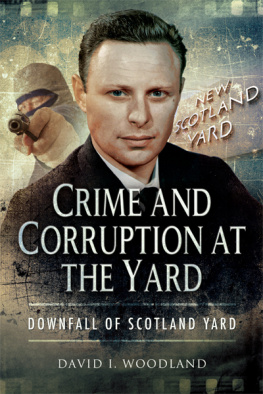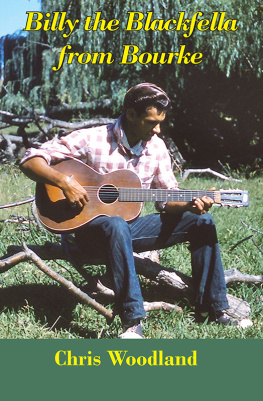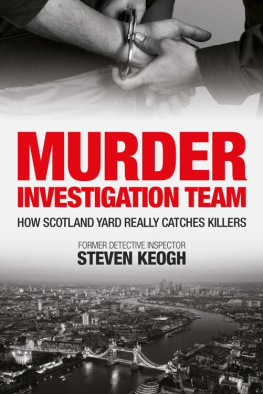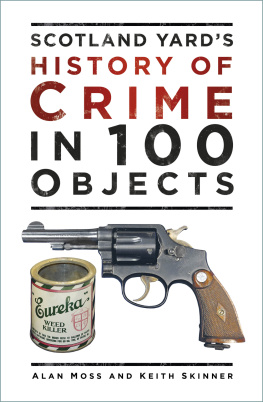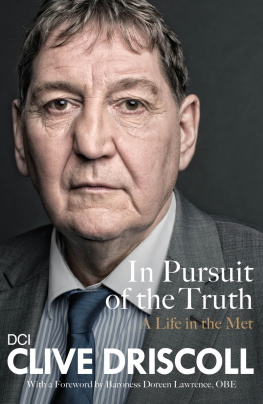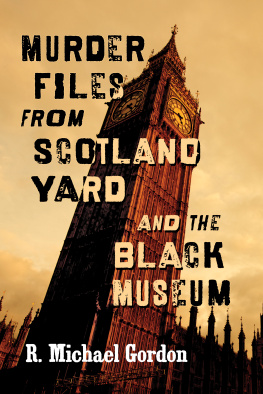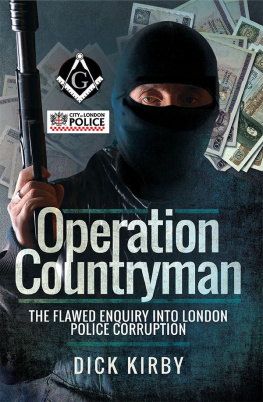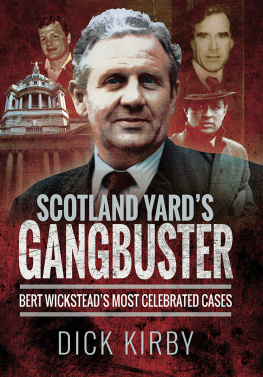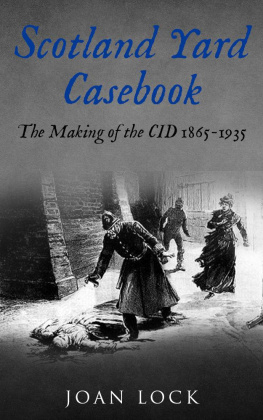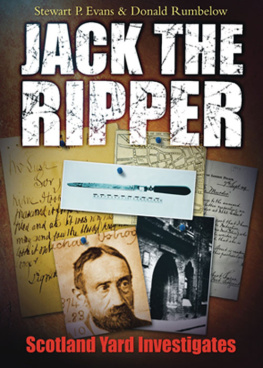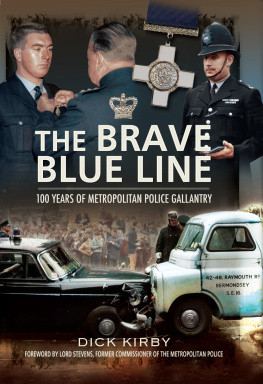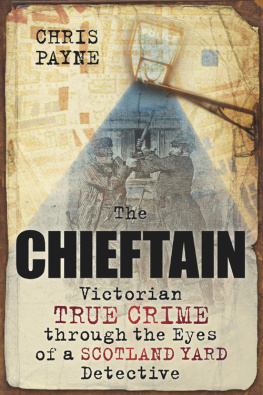First published in Great Britain in 2015 by
Pen & Sword True Crime
an imprint of
Pen & Sword Books Ltd
47 Church Street
Barnsley
South Yorkshire
S70 2AS
Copyright David Woodland 2015
ISBN 978 1 47383 385 2
eISBN 9781473857407
The right of David Woodland to be identified as the Author of this Work has been asserted by him in accordance with the Copyright, Designs and Patents Act 1988.
A CIP catalogue record for this book is available from the British Library
All rights reserved. No part of this book may be reproduced or transmitted in any form or by any means, electronic or mechanical including photocopying, recording or by any information storage and retrieval system, without permission from the Publisher in writing.
Pen & Sword Books Ltd incorporates the imprints of Pen & Sword Archaeology, Atlas, Aviation, Battleground, Discovery, Family History, History, Maritime, Military, Naval, Politics, Railways, Select, Transport, True Crime, and Fiction, Frontline Books, Leo Cooper, Praetorian Press, Seaforth Publishing and Wharncliffe.
For a complete list of Pen & Sword titles please contact
PEN & SWORD BOOKS LIMITED
47 Church Street, Barnsley, South Yorkshire, S70 2AS, England
E-mail: enquiries@pen-and-sword.co.uk
Website: www.pen-and-sword.co.uk
Contents
Acknowlegements
M y thanks are due firstly to Brigadier Henry Wilson, Barnaby Blacker, Matt Jones, Jon Wilkinson and the staff at Pen and Sword Publishers who had the courage to take on an unknown author and the patience to guide him through the intricacies of book publishing. Thanks also to the help received from many sources and in particular to my old chum Dick Kirby, author, a great hands on copper of the old school, ex Flying and Serious Crime Squads, who has been a source of inspiration and help throughout the process; to my three sons David, Tony and Richard for their support and in particular to Tony for his help on the computer with picture collation and transmissions and help with copyright approvals; to Richard who took pity on his dad and undertook the laborious task of indexing the final manuscript; to the friends and ex colleagues, at least most of them, with whom I had the privilege to serve; to all serving Police Officers who despite the overwhelming restraints imposed by political correctness and the loony, liberal left, still place their lives at risk daily to protect the public for little or no thanks; also to their wives and partners who loyally support and stand by them.
Thanks to Linda Rhodes, Local Studies Librarian, Barking and Dagenham and to Lee Shelden authors of The Dagenham Murder published by London Borough of Dagenham and Barking for the photograph of the restored memorial to PC George Clark, murdered in 1846. Thanks to Jimmy Smith, photographer and author of Undaunted , my old colleague from C11 days for the help and photographs he kindly allowed me to reproduce; to Adam Shand author, The Kangaroo Gang , the team of Full Box Production and some of the Aussies we met up with again in London in 2010 whilst shooting the BBC TV series. Also to Getty Images for pictures of Lord Moynihan of Leeds and Rex Agency for the picture of John Du Rose, Nude Murder Squad.
Every effort has been made to trace and contact copyright holders for pictures used in the plate section and I offer my apologies for any inadvertent omissions which will be corrected in future print runs.
All net proceeds of sale will be distributed in full by way of donations to the following charities: Metropolitan and City Police Orphans Fund, Ex-CID Officers Association Welfare Fund, Rotary International, Orbis Flying Eye Hospital UK and Cancer Research UK.
Prologue
A good police force is one that catches
more criminals than it employs
Sir Robert Mark 19172010
I n May, 1972, Sir Robert Mark, newly appointed Commissioner of Police marched into the Conference Room at New Scotland Yard, London. Assembled before him were the whole of the senior CID Officers responsible for containing crime within the seven hundred and fifty square mile area of operation of Londons Metropolitan Police (The Met). A buzz of nervous anticipation swept throughout the room. New brooms usually have a habit of sweeping clean and this man like so many before, would certainly wish to place his own imprimatur upon this new command.
Mark had long held pre-conceived ideas concerning the probity of the Metropolitan CID and would certainly lose no opportunity to put these into effect. Mark glanced, almost scornfully around the room and the tension was clearly discernible and rising. What he said then was to change long established methods of policing throughout London, all major cities and indeed the whole country forever.
You men represent what has long been the most routinely corrupt organisation in London. Nothing and nobody will prevent me from putting an end to this corruption and if necessary I will put the whole of the CID back into uniform and start again. Gasps of astonishment swept throughout the room as the totally uncompromising import of his words swept home. There was to be no mere tinkering around the edges, this was a declaration of full blooded war and the assembled senior officers and the whole of London CID were the avowed targets.
One of the most influential members at that select gathering was David Clarence Dilley, Commander, Criminal Intelligence Department, (C.11) charged with investigation into organised crime and criminals within the Metropolis. Tremendous power lay within this mans hands, through the vast network of detectives, contacts and assets at his disposal including sophisticated surveillance and electronic equipment that his Department possessed. Perhaps the most potent was the means and ability to officially eavesdrop upon any telephone conversation made within the United Kingdom. This alone was sufficient to make Dilley the repository of more secrets than perhaps it was safe for any one man to possess.
Sir Robert Mark would have been astonished when at the end of his short but forceful peroration, Dilley strode purposefully back to his office on the fourth floor and called a meeting of his whole command. He told the assembled group of the meeting and of Marks determination to wipe out any vestiges of corruption. The vast majority of his subordinates were honest, hard working cops and to their astonishment, in what can only be described as a momentous Freudian slip from his usual bland inscrutability, he made this extraordinary comment. The good times are over, theres no longer any chance of doing the business. If any of you have got anything going, get out of it now.
As Mark makes clear in his autobiography, In the Office of Constable , over the following months the impact of the internal complaints department (A.l0), formed to investigate allegations of corruption within the Force, was considerable. Suspensions from duty averaged about fifty a month and very few suspended officers ever resumed duty. Along with the crooked cops against which Marks crusade was directed, a number of honest officers decided to call it a day and retired on pension. What led to this extraordinary state of affairs where the once world famous Scotland Yard had fallen so far from grace? In no small part their credibility as a body was deliberately shattered by their leader.
At the time of Marks declaration of war, for that is precisely what it was, I was a Detective Inspector (D.I.) serving under Commander Dilley in C.11 Department. This book covers my journey through this turbulent period of police history and the profound effects it had upon myself and upon the vast majority of honest, dedicated detectives with whom I was privileged to work. It also touches upon the more seamy side and illustrates the difficulties faced by honest coppers betrayed or sabotaged by the minority.

